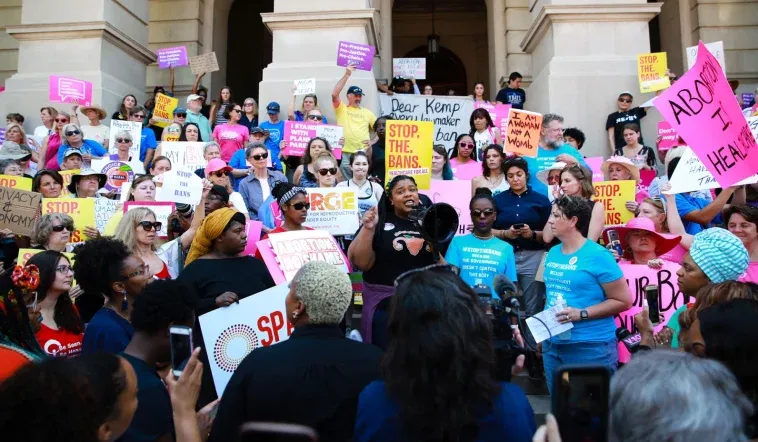(National Review) For two months this fall, Flynn Johnson used his Sunday sermons to explore the role of the church in modern culture, and to emphasize the need for Christians to carry Heaven’s agenda in the world. Near the end of the eight-week series, he turned to the topic of abortion.
Johnson, the bishop at Metro City Church, a midsize black church in Atlanta, said he called for parishioners burdened by the sin of abortion to come forward for prayer. He was shocked, he said, when dozens of members — many of them men — rose from the pews.
“I didn’t think it would be that many,” Johnson said of the scene. “Honestly, it broke me up.”
Johnson, a fierce abortion opponent, believes that human life, born and unborn, is sacred, and that killing the unborn for convenience is a sin. He’s saddened by how common the practice has become in Atlanta, and about the toll it’s taken on the city’s black community.
According to Georgia health-department data, there were 34,988 abortions performed in the state last year, and 22,815 of them, or about 65 percent, were performed on black women. In Fulton County, which includes Atlanta, the numbers are even more striking: Of the 6,808 abortions performed in the county last year, 74 percent were performed on black women, who constitute 45 percent of all women in the county. Last year, there were nearly as many black abortions in Fulton County (5,037) as there were black births (5,507), according to state data.
 Flynn Johnson, bishop of Metro City Church in Atlanta, Ga. (Flynn Johnson)
Flynn Johnson, bishop of Metro City Church in Atlanta, Ga. (Flynn Johnson)
“Who have we put in the ground? What potential leadership have we put in the ground? What potential creativity have we put in the ground?” Johnson asked. “The loss is incalculable.”
Abortion has been a leading political issue nationwide in the wake of the Supreme Court’s June ruling in Dobbs. Democratic strategists have been counting on a backlash to the ruling and to alleged Republican extremism on the issue to buoy their candidates in November.
Abortion has also featured prominently in the Senate race between Herschel Walker, a pro-life Republican and former football star accused of paying for a former girlfriend’s abortion, and incumbent Democrat Raphael Warnock, a self-described pro-choice pastor. During a mid-October debate, Walker questioned Warnock about his position. “He told me black lives matter. And if you think about it, senator, in Atlanta, Georgia, there’s more black babies that are aborted than anything,” said Walker, asking, “Why are you not baptizing those babies?”
The data back up Walker’s point. Despite its reputation as a highly religious and Christian state, Georgia has one of the country’s highest abortion rates. The Guttmacher Institute, a pro-abortion research group, found that Georgia had the seventh-highest abortion rate of any state in 2020 — 18.9 abortions per 1,000 women ages 15 to 44. Most of those abortions, especially in the Atlanta area, are performed on black women.
In that regard, Georgia is not unique. According to data from the U.S. Centers for Disease Control and Prevention, in the 29 states (plus Washington, D.C.) that reported racial and ethnic data on abortion in 2019, 38 percent of all abortions were performed on non-Hispanic black women, higher than non-Hispanic whites (33 percent) and Hispanics (21 percent). According to that CDC data, most abortions were performed on black women in five states (Mississippi, Georgia, Alabama, Michigan, and Tennessee), whereas black women had the highest number of abortions, but not a majority, in five other states (North Carolina, Arkansas, Virginia, New Jersey, and Florida). Several prominent blue states, including California, Illinois, New York, Oregon, and Washington did not report racial and ethnic data to the CDC.
Dr. James Sherley, a Johns Hopkins-trained stem-cell biologist and an associate scholar at the pro-life Charlotte Lozier Institute, has studied the rate of abortion in the black community. Sherley, who is black, calls it “just mind-boggling.” For decades, black children in the U.S. have not had an equal opportunity to survive until birth, he wrote in a 2020 paper.






